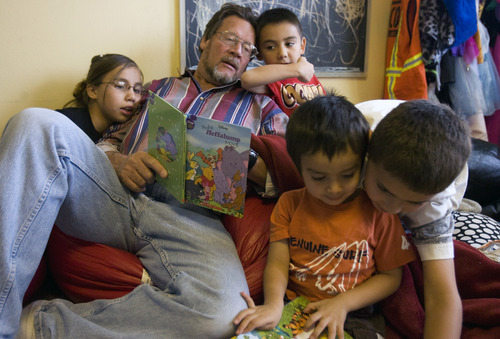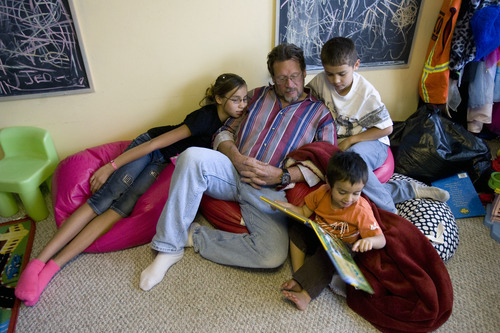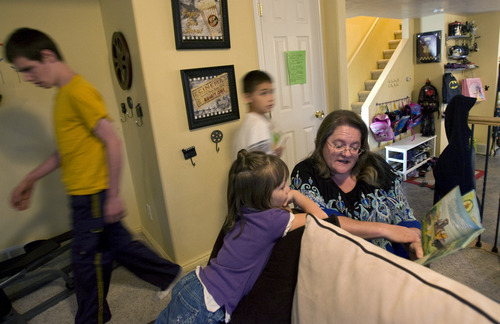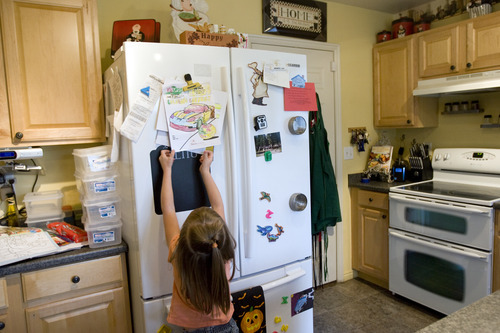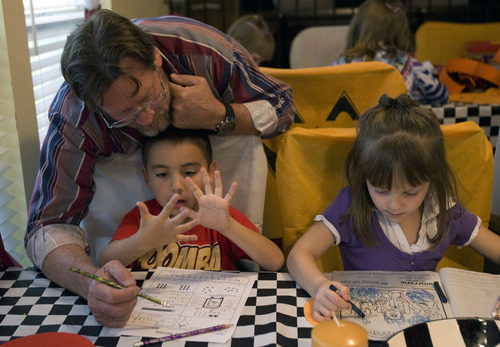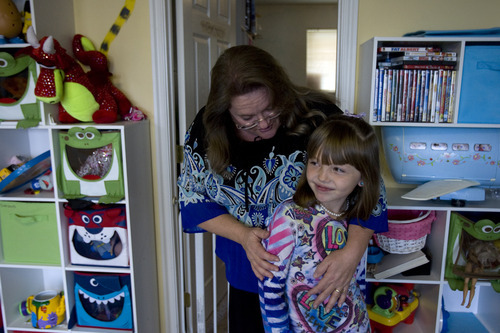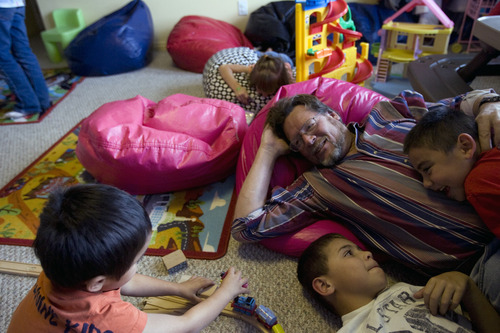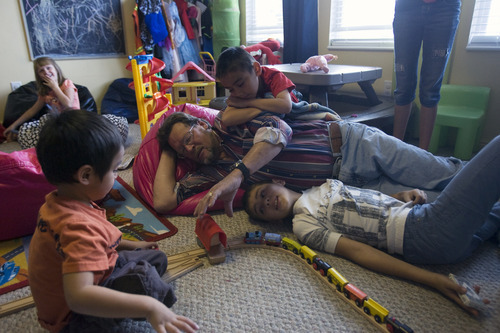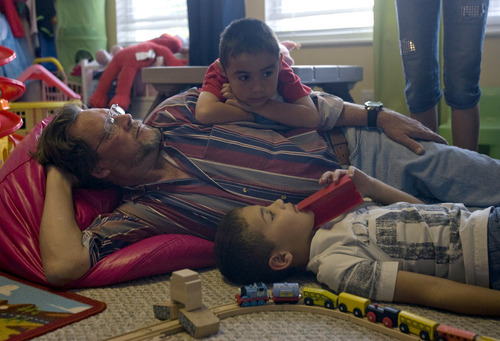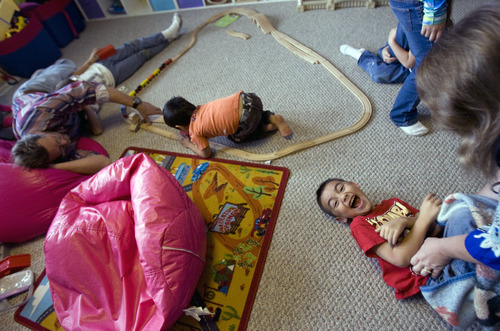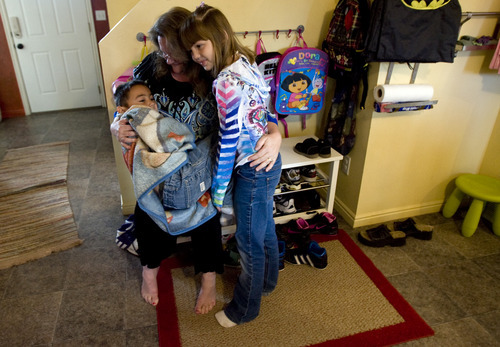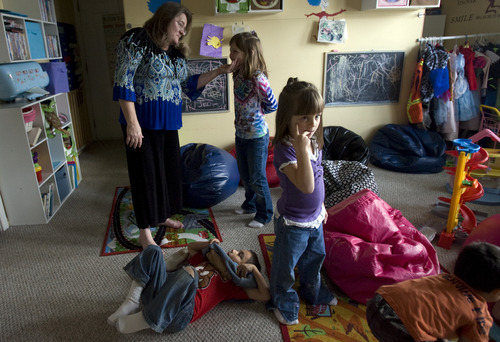This is an archived article that was published on sltrib.com in 2012, and information in the article may be outdated. It is provided only for personal research purposes and may not be reprinted.
There has always been room in Happie and Richard Larson's hearts for one more child — and thanks to a federal adoption tax credit, money to ease the transition as their family expanded again and again and again.
The Larsons have adopted 15 children from foster care — including 6-year-old Piper, who in June joined two sisters who were already part of the family. The Larsons learned about the tax credit with the adoption of their 12th child, and it made it possible for them to buy a larger home that enabled them to take in three more children.
But the tax credit, which expires this year, is in jeopardy and adoption experts say that unless Congress acts to renew it, fewer families like the Larsons may be able to step up and provide homes for children in need.
"Right now, it allows middle-class and working-class families to adopt," said Denise Bierly, president of the American Academy of Adoption Attorneys, which held its annual symposium in Salt Lake City recently. "It will have a negative impact on the ability of families to adopt and therefore have a negative impact on children unless Congress acts."
—
Capping the credit • Two bills pending in Congress would renew and expand the credit, making it a permanent, refundable claim. The bills also would establish a flat refundable sum for families who adopt special needs children. All adoptions — foster care, private or international — would qualify.
Both Rep. Rob Bishop, R-Utah, and Rep. Jim Matheson, D-Utah, back the adoption tax-credit legislation proposed in the House. Sen. Orrin Hatch, R-Utah, has not reviewed a Senate bill proposed in September but has long supported an adoption tax credit. While sympathetic to the challenges adoptive families face, Sen. Mike Lee, R-Utah, is waiting for the bill to make it through committee before deciding whether to back it. Rep. Jason Chaffetz, R-Utah, also is still reviewing ramifications of the bill and hasn't decided whether to support it, according to a spokeswoman.
The law has been around in one form or another since 1997, mostly as a credit to reduce tax liability. In 2010 and 2011, tax filers were able to get a refund of up to $13,170 for some itemized adoption expenses. In the case of special-needs children, families were able to claim a refund outright, without having to provide expense receipts. This year, the maximum amount was dropped to $12,650 and tax filers could only claim expenses as a credit against tax liability.
Next year, the credit will only apply to special-needs children adopted from foster care; it also will be capped at $6,000 in qualified expenses — court costs, attorney fees, travel expenses, etc.
That likely could have a huge impact on adoptions, said Liz Sollis, spokeswoman for the Utah Division of Child and Family Services.
"Adoption subsidies, though helpful, are often not enough to cover the costs that can come with adopting — especially in the case of children with special needs," she said. "Examples of additional costs could include purchasing a larger vehicle or home, making accommodations and renovations for wheelchairs, having to remodel a home so that children have separate rooms, which is especially important in cases in which a child has been a perpetrator of sexual abuse, medical treatment, mental health treatment, substance abuse treatment, etc."
In the U.S., about 68 percent of the nearly 135,000 adoptions that take place each year involve children in foster care, according to Adam Pertman, director of the Evan B. Donaldson Adoption Institute and author of Adoption Nation. An additional 15 percent are intercountry adoptions, mostly from orphanages and institutions in foreign countries.
That means 83 percent of adopted children were neglected, abused or institutionalized because of poverty or parents' incapacity or death before joining a new family, bringing with them a traumatic background and special needs, which often takes more than love to heal, he said.
—
Help for families • Happie Larson said most of the children who have joined their family had intellectual impairments that required special adaptations in their home, tutoring services and other help.
"In talking to many foster parents, it does affect them when they are able to use these monies to do home repairs … and to meet the needs of children who are often extraordinary," said Larson, president of the Utah Foster/Adoptive Families Association.
In fiscal year 2011, 520 Utah children who were in foster care were adopted, Sollis said.
"With the increased emphasis on providing adoptive parents with the services and resources they need to raise an adopted child, since 2005, more than 98 percent of adoptions of children from state care have been successful," she added.
Deborah Lindner, spokeswoman for the Utah Foster Care Foundation, said while adoption is a primary goal for some, most families aren't thinking about the tax credit when they sign up as foster parents.
"They think about how they want to help children," she said. "It becomes more of an issue as adoption becomes more of a reality … and if they want to adopt more children, it may affect that decision."
But the tax credit also has a significant impact on private adoptions.
"I know that most adoptive families like it very much," said David Hardy, an adoption attorney in Salt Lake City, adding that, depending on the agency, the credit may cover all or some expenses associated with an adoption.
"There are some families who are in a financial position where they can care for a child, but the idea of having to fork over $20,000 to $30,000 to pay adoption expenses are prohibitive, and the adoption tax credit makes that possible."
Bierly said federal fiscal analysts estimate the credit costs the government $1.2 billion in refundable payments.
"We think that is a drop in the bucket when you look at other budgets and the value to society" of finding permanent homes for children in foster care, Bierly said. "That is a child less likely to need youth services, to need mental health services, to be incarcerated."
Twitter: @Brooke4Trib


